Guido Westerwelle
![]()
Westerwelle is a redirect to this article. For the film director see Stefan Westerwelle.
Guido Westerwelle ( ![]() , * 27 December 1961 in Bad Honnef; † 18 March 2016 in Cologne) was a German politician. He was a founding member and from 1983 to 1988 chairman of the Young Liberals, from 1994 to 2001 Secretary-General and from 2001 to 2011 Federal Chairman of the Free Democratic Party (FDP). Furthermore, Westerwelle was chairman of the FDP parliamentary group and leader of the opposition in the German Bundestag from 2006 to 2009. From 2009 to 2013, he was Federal Minister of Foreign Affairs in the Merkel II cabinet, as such he also served as Vice Chancellor from the time he took office until May 2011.
, * 27 December 1961 in Bad Honnef; † 18 March 2016 in Cologne) was a German politician. He was a founding member and from 1983 to 1988 chairman of the Young Liberals, from 1994 to 2001 Secretary-General and from 2001 to 2011 Federal Chairman of the Free Democratic Party (FDP). Furthermore, Westerwelle was chairman of the FDP parliamentary group and leader of the opposition in the German Bundestag from 2006 to 2009. From 2009 to 2013, he was Federal Minister of Foreign Affairs in the Merkel II cabinet, as such he also served as Vice Chancellor from the time he took office until May 2011.
Live
Education
Westerwelle was born in Bad Honnef in 1961, the son of Heinz Westerwelle (1930-2013), a lawyer and economist with a doctorate from Schötmar, and Erika Westerwelle (1930-2018), a lawyer from Bad Salzuflen. A brother followed in 1964. In addition, his parents had each brought a son into the marriage from previous partnerships. Westerwelle's parents divorced when he was eight years old; he grew up with his father in Heerstraße in Bonn's Nordstadt district. Westerwelle attended a grammar school, but after the first year he transferred to the Realschule in Königswinter, as his academic performance at the grammar school was deemed inadequate. He graduated from the Freiherr-vom-Stein-Realschule in Bonn in 1977 with the intermediate school leaving certificate. After the Realschule he changed to the Ernst-Moritz-Arndt-Gymnasium (EMA) in Bonn, where he graduated in 1980. According to his own statements, he was not called up for military service, as he had been discharged because of his same-sex orientation.
Afterwards (from 1980) he began studying law at the University of Bonn, which he completed in 1987 with the first state law examination. After his legal clerkship at the District and Regional Court of Bonn, he passed his second state law examination in 1991. In 1994 he was awarded a doctorate in law (Dr. iur.) from the Fernuniversität in Hagen with a dissertation on the subject of party law and political youth organisations. His doctoral supervisor was Dimitris Tsatsos. Admitted to the bar in 1991, Westerwelle worked in his father's law firm in Bonn until his election as Secretary General of the FDP in 1994.
Party career
Westerwelle had been a member of the FDP since 1980. Here he was one of the co-founders of the Young Liberals, who replaced the Young Democrats as the party's official youth organization after the FDP's change of coalition in 1982. In 1983, in a run-off election against Andreas Reichel, he succeeded Hans-Joachim Otto as their federal chairman; a post he retained until 1988. From 1988 he was a member of the FDP federal executive. From 1993 to 1999 he was also chairman of the Bonn FDP district association. He cited Hans-Dietrich Genscher as his role model.
From 1994 to 2001, he was Secretary General of the FDP under party leaders Klaus Kinkel and Wolfgang Gerhardt. In this capacity, he played a significant role in the reformulation of the current party programme, the Wiesbaden Principles, and chaired the commission that drafted the programme.
On May 4, 2001, at the 2001 FDP federal party convention in Düsseldorf, he was elected by a large majority to succeed Wolfgang Gerhardt as the FDP's youngest federal chairman to date. He positioned the party primarily in education and economic policy. His intended course was that of an "independent alternative to CDU/CSU and Red-Green" and the creation of an equidistance to the two mainstream parties. In the 2002 federal election, he ran as the first candidate for chancellor in the history of the FDP. On the initiative of him and Jürgen Möllemann, the FDP entered the election campaign without a coalition statement for the first time in many years. The FDP's share of the vote improved from 6.2 percent, which it had achieved in the 1998 federal election, to 7.4 percent. Originally planned was an election target of 18 percent vote share, christened "Project 18", for which Westerwelle fought for votes in the 2002 election campaign with the so-called Guidomobile. The way in which he contested his campaign earned him the accusation of conducting too much "fun campaigning".
In 2003, Westerwelle was re-elected as party chairman with 79.8 percent of the delegates' votes, and in 2005 he was confirmed in office at the federal party congress in Cologne with 80.1 percent of the votes. In 2007, Westerwelle was elected with his best result to date at the federal party conference in Stuttgart with 87.6 percent.
Before the 2005 state election in North Rhine-Westphalia, Westerwelle was the only top politician to call for a new Bundestag election in the event of a change of government in North Rhine-Westphalia. Chancellor Gerhard Schröder announced on 22 May 2005 after the lost NRW election that he would seek an early federal election. The following day, the FDP nominated Westerwelle as the FDP's top candidate for the 2005 federal election.
2009 election success and consequences
On 15 May 2009, Westerwelle was confirmed in office as party leader with 95.8 percent at the FDP federal party conference in Hanover. Under his chairmanship, the FDP achieved its best ever result in a federal election in 2009, with 14.6 percent of the vote. In the coalition negotiations with the CDU, Westerwelle was seen by many media representatives as a future Federal Finance Minister, due to the strong financial and economic policy orientation of his party; however, he became Federal Foreign Minister.
One of Westerwelle's internal party critics was the Schaumburg Circle, an inner-party circle with a liberal market orientation. In December 2010, it became known that a member had leaked internal information from talks within the Schaumburg Circle about a possible replacement of Westerwelle as party leader and foreign minister to the press.
In 2011, Westerwelle came under pressure as chairman when the FDP lost massive votes in the state elections of Saxony-Anhalt, Rhineland-Palatinate and Baden-Württemberg and only managed to re-enter parliament in Baden-Württemberg. This was compounded by Germany's abstention in the vote on UN Security Council Resolution 1973, which Westerwelle refused to endorse due to military involvement. Although this decision promised resonance with the population, it was criticized in the press. At the federal party conference of the FDP on 13 May 2011, he did not run again and thus gave up his position as party chairman. The new chairman was the former Minister of Health Philipp Rösler. In November 2015, Westerwelle declared that he felt confirmed in his policy of military restraint, even in retrospect, and no longer regarded it as seriously contested since his successor as Foreign Minister, Frank-Walter Steinmeier, had also adopted this policy.
Parliamentary
On 8 February 1996, Westerwelle succeeded Heinz Lanfermann, who had resigned, in the German Bundestag. On 2 July 2005, Westerwelle was elected with 48 out of 49 votes cast as the FDP candidate for the constituency of Bonn, in which he received around 14 percent of the primary vote in the 2002 Bundestag election. On 10 July 2005, the North Rhine-Westphalian state election assembly in Gütersloh elected Westerwelle to first place on the state list with 93.1 percent of the vote. In the 2005 Bundestag election, he received 8.7 percent of the first-place votes in the Bonn constituency; in the 2009 Bundestag election, he received 19.1 percent of the first-place votes in the same constituency.
After the 2005 Bundestag elections, he agreed with Wolfgang Gerhardt to succeed him as chairman of the Bundestag parliamentary group in May 2006. This decision was confirmed by the parliamentary group in a "reserve election", but Westerwelle received a significantly worse result than Wolfgang Gerhardt in his re-election as parliamentary group chairman. On 1 May 2006 Westerwelle took office and gave it on 26 October 2009 in the course of his move to the Foreign Office to Birgit Homburger.
In the legislative period from 2005 to 2009, Westerwelle gave around 30 lectures for which he received remuneration of between €7,000 and €15,000, according to the details of supplementary income on the website of the German Bundestag, which are subject to publication. He also received between €7,000 and €15,000 per year as a member of the Supervisory Board of the insurance group ARAG and as a member of the advisory boards of Deutsche Vermögensberatung AG, Hamburg-Mannheimer Versicherungs AG and the management consultancy TellSell Consulting GmbH.
Due to the failure of the FDP to clear the five-percent hurdle, he left parliament with the constituent session of the 18th German Bundestag on 22 October 2013.
On 17 December 2013, his immediate predecessor, Frank-Walter Steinmeier, was appointed to succeed him as Foreign Minister.
Westerwelle Foundation
→ Main article: Westerwelle Foundation
After the FDP left the Bundestag in the 2013 parliamentary elections, Westerwelle founded the non-profit Westerwelle Foundation - Stiftung für internationale Verständigung (Foundation for International Understanding) together with the entrepreneur Ralph Dommermuth. The foundation began operations in January 2014 and Westerwelle took over as chairman of the foundation's board. The foundation is based in Berlin.
Other mandates
In 2015, Westerwelle was appointed to the Bertelsmann Stiftung's Board of Trustees, where he remained until his death. Westerwelle was also associated with the foundation as a conference speaker.
Private life, illness and death
Westerwelle had a brother, who is also a lawyer, and two half-brothers. He lived in an apartment building in Cologne-Braunsfeld and in Berlin-Charlottenburg and was a member of the Evangelical Church in the Rhineland. Since 2003 he lived in a partnership with the manager Michael Mronz. On 17 September 2010, the two entered into a civil partnership at the Bonn registry office on Poppelsdorfer Allee. The partnership was performed by the then Lord Mayor Jürgen Nimptsch. Already in 1997, Westerwelle was mentioned by name in the first edition of the reference book Out! which lists homosexual public figures, without him objecting to being named. However, Westerwelle did not have his public coming-out until the summer of 2004, through a headline on July 21 in Bild, after he and his partner made their first public appearance at a celebration of the 50th birthday of the then CDU/CSU parliamentary party leader Angela Merkel. This made him the third top German politician, after Wowereit (2001) and von Beust (2003), to make his homosexuality known to a wider public.
On 20 June 2014, it became known that Westerwelle was suffering from acute leukaemia. The disease was diagnosed by chance during a preliminary examination for a knee operation, which showed conspicuous changes in the blood count. Immediately after the diagnosis, Westerwelle began chemotherapy at Cologne University Hospital. Westerwelle made his first public appearance after the cancer diagnosis one month later at the CHIO Aachen horse show. After four and a half months of inpatient treatment, which included a stem cell transplant in September 2014, Westerwelle was released from hospital in November 2014.
In 2015, Westerwelle published the book Zwischen zwei Leben (Between Two Lives) together with Dominik Wichmann. To present the book, he made two television appearances in autumn 2015 and gave an extensive interview to Der Spiegel. From the end of November 2015, he was again treated as an inpatient at Cologne University Hospital in Lindenthal. There he succumbed to the consequences of his illness on 18 March 2016.
Westerwelle was buried on 2 April 2016 after an ecumenical funeral service in the Roman Catholic Basilica of St. Apostles at Melaten Cemetery in Cologne. Catholic Prelate Karl Jüsten, who like Westerwelle was born in Bad Honnef in 1961 and had known him since early childhood, held the funeral service together with Protestant Prelate Martin Dutzmann. Martin Dutzmann was in charge of the liturgy, Karl Jüsten gave the sermon.
Documentaries on Guido Westerwelle's death
- Guido Westerwelle 1961-2016, Das Erste (A film by Verena Bünten)
- On the death of Guido Westerwelle - Between a high and a low fall, ZDF (A film by Thomas Daniel)
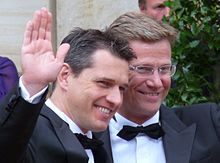
Guido Westerwelle with his life partner Michael Mronz (2009)
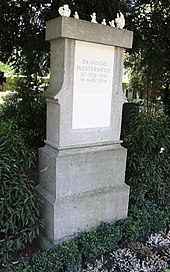
The grave of Guido Westerwelle (2017)
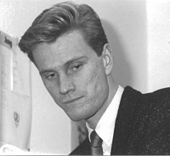
Guido Westerwelle as Federal Chairman of the Young Liberals (1982)
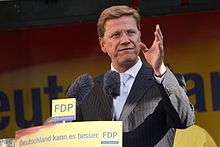
Guido Westerwelle during a campaign event for the 2009 Bundestag elections in Hamm, Germany
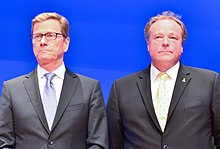
Guido Westerwelle (l.) and Dirk Niebel (r.) at the election party of the federal FDP in the Berlin Congress Center for the 2013 Bundestag elections.
Positions
Statements on unemployment benefit II
In February 2010, Westerwelle used the Hartz IV ruling of the Federal Constitutional Court as an opportunity to criticize the - in his opinion - overflowing German welfare state, which he pushed in the Springer press in particular. He was also accused of social coldness and patronage politics by the opposition and parts of the CDU/CSU because of the statement "Whoever promises the people effortless prosperity invites late Roman decadence". This and other formulations were criticized as inappropriate. According to Westerwelle's own statements, the accusation of alleged decadence referred to the system and not to the circumstances of the transfer recipients. "I never said the Hartz IV rates are decadent. The system is decadent." In March 2013, he distanced himself from his choice of words, stating that he had "not criticized people who have a difficult social fate" with his statement.
Use of nuclear energy
In 2003, Westerwelle declared that the lifetime of existing German nuclear power plants should not be prematurely terminated, but extended again. This could reduce the consumption of oil and coal. Nuclear power was part of the German energy mix, which also included solar and wind energy. In the course of the following years, Westerwelle consistently advocated this demand. In 2010, the black-yellow coalition decided to extend the lifetimes of nuclear power plants. As a result of the nuclear accidents at Fukushima, the black-yellow coalition decided on a moratorium on the extension of the operating lives of German nuclear power plants, which it had previously decided on, and finally on the nuclear phase-out by 2022 with the nuclear consensus.
Gasoline prices
In April 2008, Westerwelle called for the VAT rate on petrol to be reduced to 7%, because driving a car should not become a luxury.
Economic policy
Westerwelle regularly called for an internationally competitive tax system, fundamental reform of social security systems, deregulation of the economy, promotion of new technologies, and more competition in education.
During the 2005 election campaign, he repeatedly declared: "I guarantee that a black-yellow coalition will set the course for a simpler system with lower and fairer tax rates in the first 100 days." At this point, Westerwelle categorically ruled out an increase in the value-added tax. In the following election campaign, Westerwelle declared that taxes had to become "simple, low and fair" and concentrated his demands in the formula "more net from gross".
Plebiscitary decision on European policy
In 2005, Westerwelle called for a German referendum on the EU Constitutional Treaty. He stated that he thought it was a big mistake that in Germany the people were not consulted on such fundamental issues.
Trade unions
In 2005, Westerwelle declared that Germany's problem was not the "alleged locust entrepreneurs mentioned by Franz Müntefering, but the Bsirskes and the Engelen-Kefers." "The union officials are the real plague in Germany." The unions' policies "cost more jobs than Deutsche Bank could ever cut." The remarks put a lasting strain on Westerwelle's relationship with the DGB.
Nuclear weapons in Germany
In October 2009, Westerwelle called for the withdrawal of all US nuclear weapons from Germany. As Federal Foreign Minister, he restarted the debate in February 2010 with a letter to NATO. Büchel Air Base in Rhineland-Palatinate is considered to be the last site of nuclear weapons in Germany within the framework of nuclear sharing.
Euro crisis
In the euro crisis, Westerwelle took sides for a further deepening of EU integration; especially during the membership vote (2011) in the FDP on the ESM. Even after the turn of the year 2011/12, Westerwelle stuck to this line, saying that Germany needed "not less, but more Europe". For this reason, Westerwelle set up a future group of European foreign ministers in mid-2012 to develop new concepts for European integration, which presented its first report in June. Westerwelle countered critics of his course, such as Frank Schäffler, with the argument that "Europe not only has its price, it also has its value."
Human rights and democracy
About Alyaksandr Lukashenka: "The last dictator of Europe", whose answer was "Better dictator than gay".
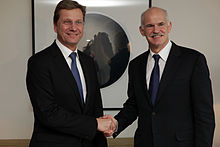
Guido Westerwelle and Greece's then Prime Minister Giorgos Andrea Papandreou (2011)
Search within the encyclopedia

